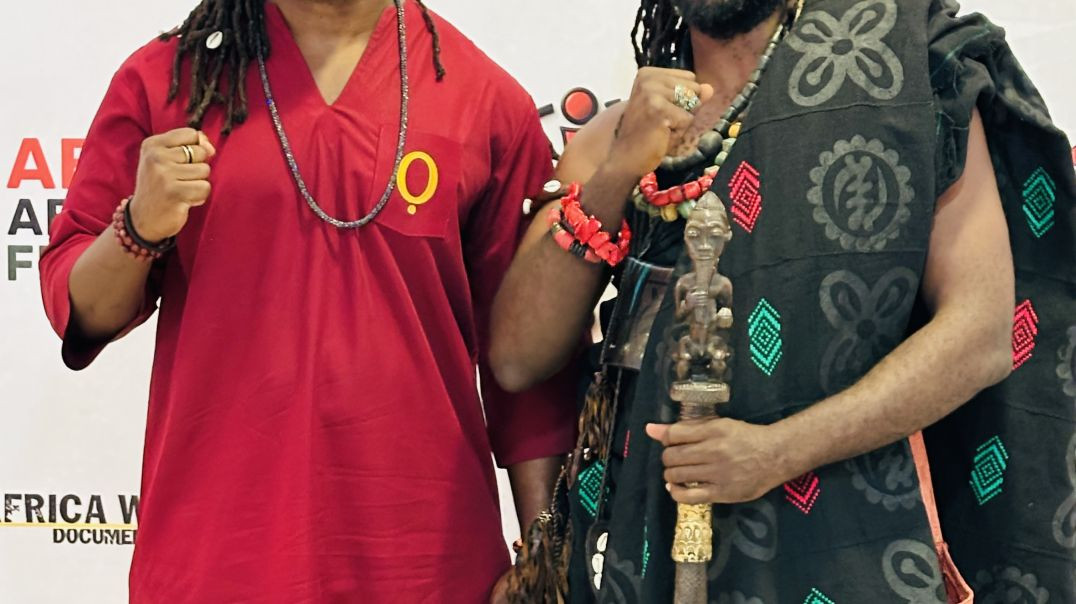Top videos
This is the first episode of The Afrikan Lion Podcast, hosted by Ọnuọra Abuah — filmmaker, educator, and founder of AEA Films.
In this episode, Ọnuọra sits with Ɔbenfo (Professor) Ọbádélé Kambon — founder of Abibitumi, Pan-African scholar, linguist, and cultural theorist — for a wide-ranging conversation on African liberation, language, and the urgent need for African-controlled cinema.
🎬 Important context:
This episode was recorded prior to the Abibitumi Conference and Abibitumi Abibifahodie Film Festival (28–30 November). Due to post-production and editing delays, the episode is being released after the festival’s conclusion. While the festival has now passed, the ideas, philosophy, and cultural mission behind it remain central and ongoing.
🦁 Topics discussed include:
– The role of Afrikan languages in mental and cultural liberation
– The legacy of Afrikan and Afrikan thinkers
– Why Afriakan cinema must be owned and controlled by Africans
– The vision and philosophy behind Abibitumi
– Storytelling as a tool of power and resistance
– Creative Afrikan entrepreneurship through ỌNUỌRA Menswear
🌍 Learn more:
– Abibitumi: https://www.abibitumi.com
– AEA Films: https://www.aeafilms.com
– ỌNUỌRA Menswear (website launching soon): https://www.onuoramenswear.com
🎧 Subscribe to The Afrikan Lion Podcast for conversations rooted in African excellence, consciousness, and liberation.
#afrikanlionpodcast #ƆbenfoỌbádéléKambon #abibitumi #africancinema #panafricanism #africanliberation #africanlanguages #abibitumifilmfestival #onuoraabuah #AfricanExcellence
https://www.decadeofourrepatri....ation.comhttps://www of Historic Diasporans and allies—in person at the Institute of African Studies (University of Ghana, Legon) and online—gathered for an urgent Ghana Citizenship Emergency Town Hall & Press Conference during the 100th Anniversary of Black History Month.This centennial moment demanded clarity and action: honoring Nana Carter G. Woodson’s blueprint while translating history into language, land, business, organized power, and a practical pathway home.Keynote Highlight: Prof. James Small (eminent Pan-Africanist) delivered a centennial keynote connecting Woodson’s 1926 vision to what we must build and implement now—year-round—through DOOR, repatriation work, and institution building.What this program covers:A formal press conference presenting a joint resolution responding to newly circulated citizenship criteria for Historic DiasporansTown Hall questions & testimonies from community membersPanel discussion: “What Does Citizenship in Africa Mean to Me?”Confirmed action steps for engagement with relevant government institutionsFeatured Speakers / Panelists:Prof. James Small, Ɔbenfo (Professor) Ọbádélé Bakari Kambon, Raswad Nkrabea, Kevoy Burton, Nana Akosua, Kofi Brian Gray (and stakeholder representatives)Event Details:Date: Sunday, February 1, 2026Time: 1:00 PM GMT / 8:00 AM EasternLocation: Institute of African Studies, University of Ghana (Legon) + OnlineReplay: https://Abibitumi.com/BHM100Ha....shtags:#BlackHistory #diasporatownhall #ghanacitizenship #door #abibitumi #repatriation #panafrican #africandiaspora #legon
Dr. John Henrik Clarke explains the utmost importance of Nationality...
wHm mswt Adesua Kuo 1
Katiuscia Ribeiro usa os ensinamentos da filosofia africana para repensar nossos comportamentos cotidianos. A partir de uma perspectiva cultural, Katiuscia convida a todos para uma reconexão com as origens de povos africanos, restaurando a história apagada e trazendo reflexões importantes para a construção de um futuro mais conectado com os saberes ancestrais.
Katiúscia apresenta a Filosofia Africana, sua origem (no antigo Egito), e problematiza os motivos de ela ser esquecida pelos acadêmicos. Ela aponta a importância dos sentimentos e da ancestralidade na Filosofia Africana.
#OfuturoÉAncestral #FilosofiaAfricana #Katiuscia Ribeiro
Inscreva-se no canal GNT: http://bit.ly/canalGNT
Assista aos programas na íntegra no Globoplay + Canais: http://bit.ly/GloboplayCanaisGNT
Site: https://gnt.globo.com/
Facebook: https://www.facebook.com/gnt
Instagram: https://instagram.com/gnt/
Twitter: https://twitter.com/canalgnt
Pinterest: https://www.pinterest.com/canalgnt
Gastronomia GNT:
Youtube: https://www.youtube.com/nhacgnt
Facebook: https://www.facebook.com/nhacgnt
Instagram: https://instagram.com/nhacgnt
Pinterest: https://www.pinterest.com/nhacgnt
Casa GNT:
Youtube: https://www.youtube.com/casagnt
Instagram: https://instagram.com/casagnt
Abibifahodie Asako End of Class Roda 9 28 2019
ANUNNAKI: THE SCIENTIFIC EXPLANATION
This is a series of Live YouTube presentations which seek to address the topic of the Anunnaki - beings who "descended from the heavens." Dr Luyaluka will explain the role of the Anunnaki as an integral part of the creation process, a process to be scientifically explained thanks to nature and deductive logic.
More infos about this event can be found on our website: https://kongospirituality.com/....kongo-spirituality-c
The four videos will be released one every sunday from 1st September 2024 on our YouTube channel (www.youtube.com/@nzilalowa1)
Bro Cadence Whatchu Kno Bout Tha 90s Presentation
Full presentation: https://www.youtube.com/watch?v=Q1GFqTGpvzg
This is the fuller version of the presentation I delivered at the Re-Engaging Pan-Africanism Conference at Birmingham City University, Dec 2018.
The presentation explores the relationship between Culture & Economics as an attempt to:
Rescue "culture" from reductive definitions by demonstrating the relationship between it & economic development.
Demonstrate how revolutionary movements have pursued economic development from a culturally appropriate foundation.
Its pre-recorded, but will be broadcast with a live chat. I look forward to hearing your feedback.
------------------------------------------------------------
► Subscribe: https://www.youtube.com/shakar....aspeaks/?sub_confirm
► Twitter https://twitter.com/ShakaRaSpeaks
► Facebook: https://www.facebook.com/ShakaRaSpeaks/
► Instagram: https://www.instagram.com/shakaraspeaks/










